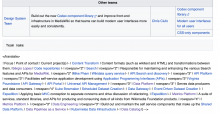The wikitext
<!-- <translate>hello</translate> -->
triggers the creation of a TU marker:
<!-- <translate><!--T:1--> plop</translate> -->
This is not handled well by Parsoid, which doesn't recognize the translation unit, just closes the comment, complains it can't find the beginning of the range (this seems to be a common cause of T302886), and displays the rest of the comment in the page.
Things work out correctly in the Legacy parser because all the markup (including TU markers) is stripped from the page before it's processed, so this doesn't trigger in the current read-views, but it does have a -possibly- significant impact on Parsoid rendering - I think it might stop all "range extension processing" moving forward, which is less than ideal - and it displays comments on the page.
I'm not sure it should be considered as valid Wikitext, but this is the behaviour of the Translate extension (and not only "people having commented out things after having creating the TU markers"), and I *can* see the use case for defining TUs for comments in the page.
I see several options:
- change the Wikitext markup for Translation Units (there's not that many wikis using Translate, it might be feasible to automate a migration?)
- handle these "comments in comments" in Parsoid and parse them as translation unit markers (this adds Translate-specific code to Parsoid)
- deprecate that usage, possibly lint for it, and leave it as that.
